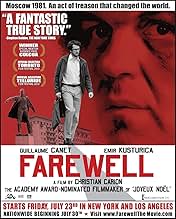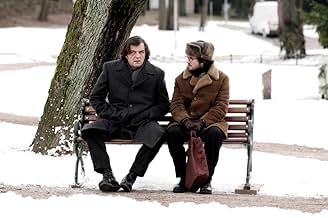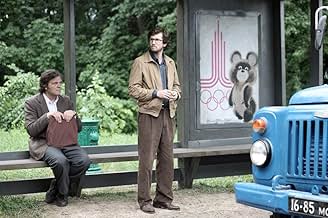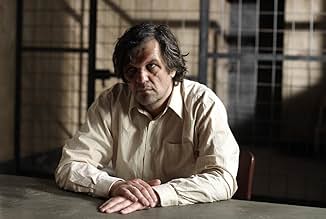NOTE IMDb
6,9/10
7,1 k
MA NOTE
Les services de renseignement français alertent les États-Unis sur une opération d'espionnage soviétique au plus fort de la guerre froide, ce qui déclenche une série d'événements malheureux.Les services de renseignement français alertent les États-Unis sur une opération d'espionnage soviétique au plus fort de la guerre froide, ce qui déclenche une série d'événements malheureux.Les services de renseignement français alertent les États-Unis sur une opération d'espionnage soviétique au plus fort de la guerre froide, ce qui déclenche une série d'événements malheureux.
- Réalisation
- Scénario
- Casting principal
Aleksey Gorbunov
- Choukhov
- (as Oleksii Gorbunov)
Evgeniy Kharlanov
- Igor
- (as Yevgeni Kharlanov)
Timothé Riquet
- Damien
- (as Timothe Riquet)
Vsevolod Shilovskiy
- Gorbachev
- (as Vsevolod Shilovsky)
Vladimir Tolstoy
- Chef du KGB
- (as Vladimir Tolsty)
Avis à la une
This is a very empowering, true-story about one man, Sergei Gregoriev, who probably did more to bring down the Communist government in Russia - and end the cold war - than any other person who ever lived! This man should be honored by a postage stamp in every Western country in the world and in every high school history textbook! What an incredibly brave human being!
I gained a lot of insights from watching this amazing film. The Russians lost an estimated 26 million people during World War 2. That's 1 in 3 people that died in all of World War 2 did so within the borders of the Soviet Union! I can only imagine the trauma and paranoia that was inflicted on the survivors who later then came to power. It didn't help either that a monster was at the head of government (Stalin) from 1924 to 1953. And, you wonder why the Soviets had a such a mind-boggling intelligence apparatus established throughout the United States? Once this network of spies was dismantled, the Soviet leadership was blind! Out of fear they bankrupted themselves on military spending because they could no longer accurately assess what actual threats the United States posed to them!
Sergei Gregoriev, knew how his government would react to such a threat and he sacrificed everything to make it happen. I don't think he would be happy with the gangster capitalism that took Communism's place. But at least there are no more brutal wars fought in desperately poor countries, which have cost millions of lives because of the Cold War! Future generations will thank you for your sacrifice, Sergei Gregoriev!
I gained a lot of insights from watching this amazing film. The Russians lost an estimated 26 million people during World War 2. That's 1 in 3 people that died in all of World War 2 did so within the borders of the Soviet Union! I can only imagine the trauma and paranoia that was inflicted on the survivors who later then came to power. It didn't help either that a monster was at the head of government (Stalin) from 1924 to 1953. And, you wonder why the Soviets had a such a mind-boggling intelligence apparatus established throughout the United States? Once this network of spies was dismantled, the Soviet leadership was blind! Out of fear they bankrupted themselves on military spending because they could no longer accurately assess what actual threats the United States posed to them!
Sergei Gregoriev, knew how his government would react to such a threat and he sacrificed everything to make it happen. I don't think he would be happy with the gangster capitalism that took Communism's place. But at least there are no more brutal wars fought in desperately poor countries, which have cost millions of lives because of the Cold War! Future generations will thank you for your sacrifice, Sergei Gregoriev!
It's 1981 in Moscow. Pierre Froment (Guillaume Canet) is low level French diplomat who meets Soviet colonel Sergei Gregoriev (Emir Kusturica). Sergei is dismissive of the young diplomat at first. He has a rebellious son at home. He wants to change the world, change the USSR, and sees himself as a patriot. He has an affair with a colleague. Mitterrand keeps the information closely guarded using the information as currency with American president Reagan. Sergei is given the code name 'Farewell'.
Based on a book, this has the sound of truth and that's what so compelling. It's not a Bond movie or even a gritty convoluted spy thriller. The meetings are so mundane and so easy. It's not a movie high in tension except for the ending. This is a spy movie with the feel of the real world. It's about a flawed human being but he's never inhuman. There are many changes to the real story. All I know is that it has a sense of the real world.
Based on a book, this has the sound of truth and that's what so compelling. It's not a Bond movie or even a gritty convoluted spy thriller. The meetings are so mundane and so easy. It's not a movie high in tension except for the ending. This is a spy movie with the feel of the real world. It's about a flawed human being but he's never inhuman. There are many changes to the real story. All I know is that it has a sense of the real world.
I had some previous knowledge of the Farewell-affair, so i came in knowing pretty much what to expect. On the whole they seemed to pull it off pretty well. The one thing that did grate me though were the scenes with Ronald Reagan in them. The acting and dialogue in those are way under par for the movie and seriously impacted my enjoyment of the rest of it.
But yeah. If you want the reverse Snowden then this is the movie for you. The pacing is all right. It is not horribly complicated, as far as spy thrillers go.
A tense dropoff here, an escape here, some exposition of character motivation, some family drama, a whiff of secrecy and an outcome which is never in doubt.
But yeah. If you want the reverse Snowden then this is the movie for you. The pacing is all right. It is not horribly complicated, as far as spy thrillers go.
A tense dropoff here, an escape here, some exposition of character motivation, some family drama, a whiff of secrecy and an outcome which is never in doubt.
My film group and I saw "Farewell" at Rendez-Vous with French Cinema at Lincoln Center in New York. We all loved it. I do hope it will have a commercial release soon so more people can see it. The acting was superb, the screenplay riveting. We did not know the story so we were kept on the edges of our seats. I gained a lot of insights into what was going on in the cold war and emerged with a very different take on what had happened and increased appreciation for the leaders of France and the U. S. and appreciation for the brave Russian agent and what he did for the world. I am looking forward to reading the book on which the film was based. The opening and closing were so beautiful and meaningful -- the meaning only grasped at the end. I will never forget them.
Farewell is the wrought piece of espionage spy fiction you didn't really expect to be as good as it is; as is often the case, films and film-makers take it upon themselves to entrust that elements of espionage and distrust between superpowers, or people therein epitomising superpowers, should make for crash-bang, explosive viewing involving very little narrative; very little character and a whole lot of wooden spectacle. It is with open arms then, that we welcome in Christian Carion's 2011 film Farewell; the anti-thesis to Mission Impossible: II or a badly drawn Bond film of the post-Dalton era. The film is one of its ilk that happens to have both a soul and a brain; these characters are people involved in international espionage and some rather dangerous stuff, but they are people involved in such things whilst doing their utmost to maintain families; they are people involved in what they're in, of whom enjoy playing tennis and reading poetry and listening to Queen – they are human beings; they can be overweight; they can wear glasses; they can relax by watching a Western, they are not stock action heroes of a ridiculously photogenic nature; they are not James Bonds darting around in sports cars out-peddling a space orientated laser beam.
The scene epitomising how Farewell really is different to most others of its ilk arrives with a snappy sequence set on a park bench between two people; as might be considered standard with any film of this ilk, we witness such a sequence that is often the first thing people think of when certain genre buzz words are mentioned. Here, the already seated man witnesses another slump down next to him so that they may continue their business – business which would result in serious ramifications should either of them be caught. Instead of cutting to the chase and prolonging causality, the new arrival first mutters about how he hates the fact he is having an affair with someone away from his marriage; that his son knows all about it and, he feels, hates him as a result. Such is the film's nature to take something familiar to the genre, or something with which we will identify, and spin it around to encompass character; to encompass problems away from what would usually be the sole and lone body of content; to take an instance as stereotypical as two blokes meeting on a park bench and incorporate some sort of air of both naturality and substance to proceedings.
The sense that we're being treated like adults begins with the opening sequence, a procession of found footage depicting numerous things Cold-war orientated ranging from shots taken from the fronts of the Vietnam War to numerous technological advancements of the 1970s alluding to the Space Race. All of it is Cold-War orientated and it arrives without voice-overs informing us of what's what and why we're seeing what we're seeing; there is no brief expositional history lesson. Guillaume Canet pays Pierre Froment, an engineer living in Russia with his family of wife and young daughter; the man observes a television set displaying a McEnroe-Borg tennis match, this sense of there being a fondness for that of duelling; a fondness of keeping up with how two super-powers in a respective field are getting along in their long, intense rivalry prominent.
The film is a double-stranded piece, a piece flicking between two men occupying Moscow in the early 1980s doing their utmost to transfer information from secretive sources onto the Americans, and that of the American president of the time in Ronald Reagan (Ward), no less, who dishes it out to his international colleagues, particularly that of then-French Socialist President François Mitterrand (Magnan), when he isn't confining with his own. Pierre's friend is Emir Kusturica's large, life-weary Soviet native to their surroundings Sergei Gregoriev; a man with his own wife and son with whom he does not get along. Sergei uses Pierre as a half-way house in his delivering of top-secret Soviet intelligence which eventually make their way through to the upper-echelons of The White House, a premise spun out by director Carion to really good effect as we delve into this world of lies and power-play.
In spite of the two strands and the array of characters, ranging from this lowly Frenchman to the President of the United States himself, it is Pierre's film; a man caught up in this mucky pool of grime and maltrust and having it go on to affect his home life and general well-being. In a subway fairly early on, it is established how efficient and how clinical the police state work; their picking up of an unknown woman after the insinuation Pierre is in trouble reiterates what he is up against - the verbal establishment beforehand of Pierre's inexperience within this field follows that of Sergei's infiltrating of the backseat to his car with enough ease to fool Pierre as to his even being there. In this regard, the tension is often palpable; if for the fact we often fear Pierre's capture, something that would not stop the film from carrying on with one of its other equilibriums but as to whether his actions will destroy his exemplary home situation and those he holds dear to him. Farewell is the spy thriller peering in at the private lives of these people; the primary stuff about passing on information and keeping informants secret acting as a mere premise to fascinating accounts of how these people exist with themselves; with their families and with one another, the bulk of it making for really good value – you could sure do worse for a thriller.
The scene epitomising how Farewell really is different to most others of its ilk arrives with a snappy sequence set on a park bench between two people; as might be considered standard with any film of this ilk, we witness such a sequence that is often the first thing people think of when certain genre buzz words are mentioned. Here, the already seated man witnesses another slump down next to him so that they may continue their business – business which would result in serious ramifications should either of them be caught. Instead of cutting to the chase and prolonging causality, the new arrival first mutters about how he hates the fact he is having an affair with someone away from his marriage; that his son knows all about it and, he feels, hates him as a result. Such is the film's nature to take something familiar to the genre, or something with which we will identify, and spin it around to encompass character; to encompass problems away from what would usually be the sole and lone body of content; to take an instance as stereotypical as two blokes meeting on a park bench and incorporate some sort of air of both naturality and substance to proceedings.
The sense that we're being treated like adults begins with the opening sequence, a procession of found footage depicting numerous things Cold-war orientated ranging from shots taken from the fronts of the Vietnam War to numerous technological advancements of the 1970s alluding to the Space Race. All of it is Cold-War orientated and it arrives without voice-overs informing us of what's what and why we're seeing what we're seeing; there is no brief expositional history lesson. Guillaume Canet pays Pierre Froment, an engineer living in Russia with his family of wife and young daughter; the man observes a television set displaying a McEnroe-Borg tennis match, this sense of there being a fondness for that of duelling; a fondness of keeping up with how two super-powers in a respective field are getting along in their long, intense rivalry prominent.
The film is a double-stranded piece, a piece flicking between two men occupying Moscow in the early 1980s doing their utmost to transfer information from secretive sources onto the Americans, and that of the American president of the time in Ronald Reagan (Ward), no less, who dishes it out to his international colleagues, particularly that of then-French Socialist President François Mitterrand (Magnan), when he isn't confining with his own. Pierre's friend is Emir Kusturica's large, life-weary Soviet native to their surroundings Sergei Gregoriev; a man with his own wife and son with whom he does not get along. Sergei uses Pierre as a half-way house in his delivering of top-secret Soviet intelligence which eventually make their way through to the upper-echelons of The White House, a premise spun out by director Carion to really good effect as we delve into this world of lies and power-play.
In spite of the two strands and the array of characters, ranging from this lowly Frenchman to the President of the United States himself, it is Pierre's film; a man caught up in this mucky pool of grime and maltrust and having it go on to affect his home life and general well-being. In a subway fairly early on, it is established how efficient and how clinical the police state work; their picking up of an unknown woman after the insinuation Pierre is in trouble reiterates what he is up against - the verbal establishment beforehand of Pierre's inexperience within this field follows that of Sergei's infiltrating of the backseat to his car with enough ease to fool Pierre as to his even being there. In this regard, the tension is often palpable; if for the fact we often fear Pierre's capture, something that would not stop the film from carrying on with one of its other equilibriums but as to whether his actions will destroy his exemplary home situation and those he holds dear to him. Farewell is the spy thriller peering in at the private lives of these people; the primary stuff about passing on information and keeping informants secret acting as a mere premise to fascinating accounts of how these people exist with themselves; with their families and with one another, the bulk of it making for really good value – you could sure do worse for a thriller.
Le saviez-vous
- AnecdotesAlexander Avdeev (Russian ambassador in France who became Russian Culture Minister and who had been expelled from France in 1983 because of Farewell) blocked most Russian actors to play in this movie, including Sergey Makovetskiy and Nikita Mikhalkov, because he did not want to back a movie about a Russian traitor. He also blocked authorizations to film in Moscow, while most of the plot takes place in Moscow. Christian Carion had to pretend to film a Coca Cola advertisement for the few images of the city.
- GaffesIn the Soviet Union, motorists would typically keep their windscreen wipers in their glove compartments for fear of having them stolen, as they were hard to come by. Yet in the movie, every single car has its wipers attached.
- ConnexionsFeatured in En bonne intelligence (2010)
Meilleurs choix
Connectez-vous pour évaluer et suivre la liste de favoris afin de recevoir des recommandations personnalisées
- How long is Farewell?Alimenté par Alexa
Détails
- Date de sortie
- Pays d’origine
- Sites officiels
- Langues
- Aussi connu sous le nom de
- The Farewell Affair
- Lieux de tournage
- Sociétés de production
- Voir plus de crédits d'entreprise sur IMDbPro
Box-office
- Budget
- 17 500 000 € (estimé)
- Montant brut mondial
- 7 406 706 $US
- Durée
- 1h 53min(113 min)
- Couleur
- Mixage
- Rapport de forme
- 1.85 : 1
Contribuer à cette page
Suggérer une modification ou ajouter du contenu manquant



































